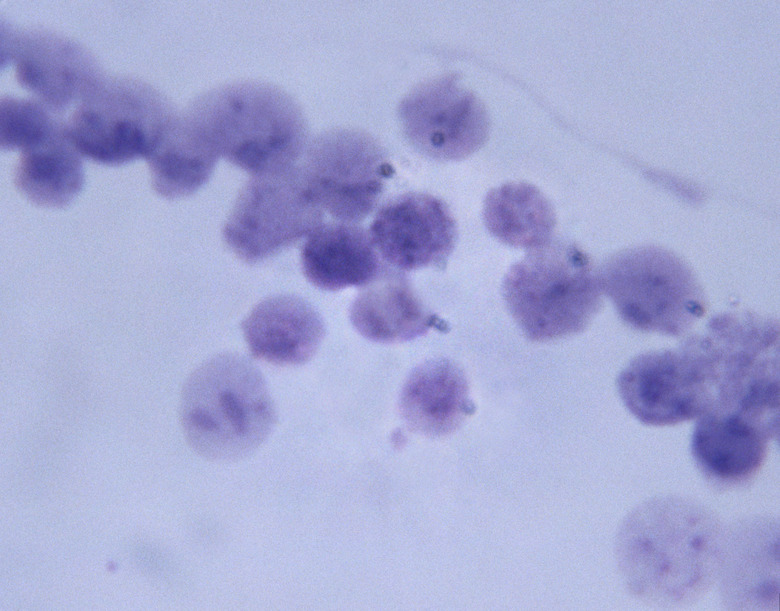What Are The Special Things That Happen When Cells Split?
Mitosis followed by cytokineses is the process of cell division in which one parent cell splits to form two new daughter cells. During mitosis, a cell's DNA is duplicated and the two new cells are exactly identical to the parent cell. Mitosis consists of four phases: prophase, metaphase, anaphase and telophase. Two additional phases, interphase and cytokinesis, occur before and after mitosis. Mitosis is a cyclical process that continues throughout the life of an organism.
Prophase Stage
Prophase Stage
Prophase is the first phase of mitosis and also the longest. In this phase, the cell's chromosomes begin to condense into tightly coiled, compact structures. This enables the chromosomes to move more easily through the cell, without getting tangled. Each chromosome consists of two identical sister chromatids that are held together by a centromere. During this phase, the nuclear membrane breaks down, and a spindle-like structure begins to form.
Metaphase Aligns Chromosomes
Metaphase Aligns Chromosomes
During metaphase, the chromosomes align themselves along a central axis of the cell, known as the equatorial plate. The spindle structure forms fully, and fibers from the spindle attach to each chromosome on both sides of the centromere. Chromosomes continue to condense.
A Brief Anaphase
A Brief Anaphase
Anaphase is the shortest phase of mitosis. The centromeres split apart during anaphase. Spindle fibers pull the two sister chromatids apart and direct them to opposite ends of the cell. Once these chromatids are separated, they are referred to as daughter chromosomes.
Telophase Wraps Things Up
Telophase Wraps Things Up
Telophase is the final phase of mitosis. Once the two sets of daughter chromosomes have reached the opposite ends of the cell, telophase begins. The nuclear membrane begins to reform around each set of daughter chromosomes. The chromosomes begin to uncoil and loosen, and the spindle fibers disappear. At the end of mitosis, there are two identical daughter nuclei.
Cytokinesis as the Next Step
Cytokinesis as the Next Step
Cytokinesis happens after mitosis. It is the final division to create two new cells. In this phase, the cytoplasm divides and two complete daughter cells are created. These two new cells have genetic information that is identical to the parent cell from which they originated.
Interphase: A Pause
Interphase: A Pause
Interphase is the period of time between mitotic divisions. This is the normal state of a cell. In this phase, the cell grows and carries out its normal cellular functions. During this time, the cell also begins replicating its chromosomes. This replication prepares the cell for its next mitotic cycle.
Cite This Article
MLA
Harris, Rae. "What Are The Special Things That Happen When Cells Split?" sciencing.com, https://www.sciencing.com/special-things-happen-cells-split-14589/. 6 August 2018.
APA
Harris, Rae. (2018, August 6). What Are The Special Things That Happen When Cells Split?. sciencing.com. Retrieved from https://www.sciencing.com/special-things-happen-cells-split-14589/
Chicago
Harris, Rae. What Are The Special Things That Happen When Cells Split? last modified March 24, 2022. https://www.sciencing.com/special-things-happen-cells-split-14589/
